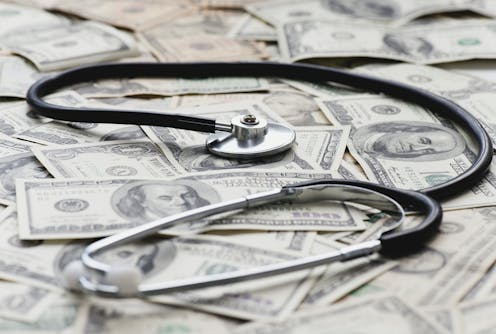
One in 10 Americans carry medical debt, while 2 in 5 are underinsured and at risk of not being able to pay their medical bills.
This burden crushes millions of families under mounting bills and contributes to the widening gap between rich and poor.
Some relief has come with a wave of debt buyouts by county and city governments, charities and even fast-food restaurants that pay pennies on the dollar to clear enormous balances. But as a health policy and economics researcher who studies out-of-pocket medical expenses, I think these buyouts are only a partial solution.
Table of Contents
A quick fix that works
Over the past 10 years, the nonprofit RIP Medical Debt has emerged as the leader in making buyouts happen, using crowdfunding campaigns, celebrity engagement, and partnerships in the private and public sectors. It connects charitable buyers with hospitals and debt collection companies to arrange the sale and erasure of large bundles of debt.
The buyouts focus on low-income households and those with extreme debt burdens. You can’t sign up to have debt wiped away; you just get notified if you’re one of the lucky ones included in a bundle that’s bought off. In 2020, the U.S. Department of Health and Human Services reviewed this strategy and determined it didn’t violate anti-kickback statutes, which reassured hospitals and collectors that they wouldn’t get in legal trouble partnering with RIP Medical Debt.
Buying a bundle of debt saddling low-income families can be a bargain. Hospitals and collection agencies are typically willing to sell the debt for steep discounts, even pennies on the dollar. That’s a great return on investment for philanthropists looking to make a big social impact.
And it’s not just charities pitching in. Local governments across the country, from Cook County, Illinois, to New Orleans, have been directing sizable public funds toward this cause. New York City recently announced plans to buy off the medical debt for half a million residents, at a cost of US$18 million. That would be the largest public buyout on record, although Los Angeles County may trump New York if it carries out its proposal to spend $24 million to help 810,000 residents erase their debt.
Nationally, RIP Medical Debt has helped clear more than $10 billion in debt over the past decade. That’s a huge number, but a small fraction of the estimated $220 billion in medical debt out there. Ultimately, prevention would be better than cure.
Preventing medical debt is trickier
Medical debt has been a persistent problem over the past decade even after the reforms of the 2010 Affordable Care Act increased insurance coverage and made a dent in debt, especially in states that expanded Medicaid. A recent national survey by the Commonwealth Fund found that 43% of Americans lacked adequate insurance in 2022, which puts them at risk of taking on medical debt.
Unfortunately, it’s incredibly difficult to close coverage gaps in the patchwork American insurance system, which ties eligibility to employment, income, age, family size and location – all things that can change over time. But even in the absence of a total overhaul, there are several policy proposals that could keep the medical debt problem from getting worse.
Medicaid expansion has been shown to reduce uninsurance, underinsurance and medical debt. Unfortunately, insurance gaps are likely to get worse in the coming year, as states unwind their pandemic-era Medicaid rules, leaving millions without coverage. Bolstering Medicaid access in the 10 states that haven’t yet expanded the program could go a long way.
Once patients have a medical bill in hand that they can’t afford, it can be tricky to navigate financial aid and payment options. Some states, like Maryland and California, are ahead of the curve with policies that make it easier for patients to access aid and that rein in the use of liens, lawsuits and other aggressive collections tactics. More states could follow suit.
Another major factor driving underinsurance is rising out-of-pocket costs – like high deductibles – for those with private insurance. This is especially a concern for low-wage workers who live paycheck to paycheck. More than half of large employers believe their employees have concerns about their ability to afford medical care.
Lowering deductibles and out-of-pocket maximums could protect patients from accumulating debt, since it would lower the total amount they could incur in a given time period. But if the current system otherwise stayed the same, then premiums would have to rise to offset the reduction in out-of-pocket payments. Higher premiums would transfer costs across everyone in the insurance pool and make enrolling in insurance unreachable for some – which doesn’t solve the underinsurance problem.
Reducing out-of-pocket liability without inflating premiums would only be possible if the overall cost of health care drops. Fortunately, there’s room to reduce waste. Americans spend more on health care than people in other wealthy countries do, and arguably get less for their money. More than a quarter of health spending is on administrative costs, and the high prices Americans pay don’t necessarily translate into high-value care. That’s why some states like Massachusetts and California are experimenting with cost growth limits.
Momentum toward policy change
The growing number of city and county governments buying off medical debt signals that local leaders view medical debt as a problem worth solving. Congress has passed substantial price transparency laws and prohibited surprise medical billing in recent years. The Consumer Financial Protection Bureau is exploring rule changes for medical debt collections and reporting, and national credit bureaus have voluntarily removed some medical debt from credit reports to limit its impact on people’s approval for loans, leases and jobs.
These recent actions show that leaders at all levels of government want to end medical debt. I think that’s a good sign. After all, recognizing a problem is the first step toward meaningful change.
![]()
Erin Duffy receives funding from Arnold Ventures.
























